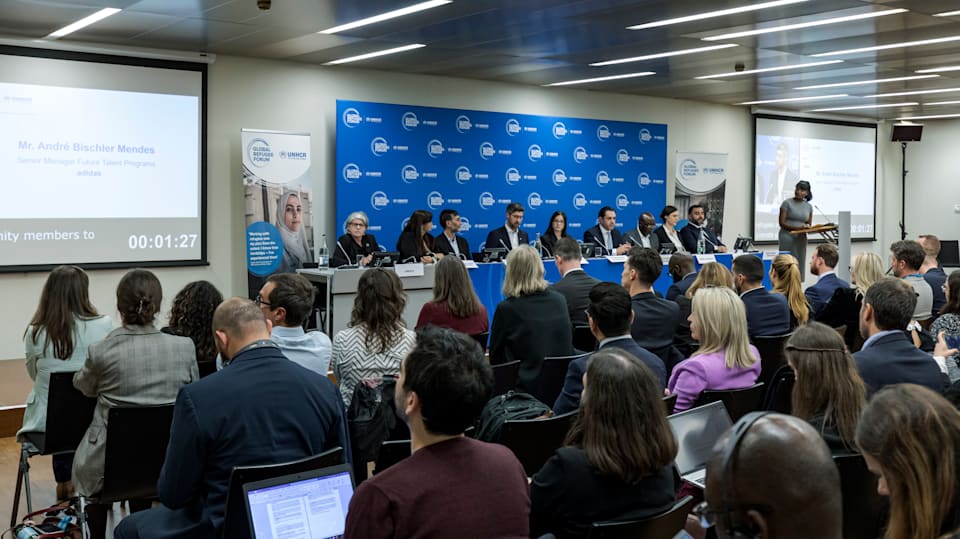Sport takes center stage at the Global Refugee Forum
Last month, faced with a global refugee crisis at an unprecedented scale, the world gathered in Geneva to find innovative solutions to this humanitarian crisis. Taking place from 13 to 15 December, the Global Refugee Forum brought together more than 4,000 participants from 168 countries. This year, thanks to the Olympic Refuge Foundation (ORF) and its Sport for Refugees Coalition Co-convenors, UNHCR and the Scort Foundation, sport took center stage at this important forum.

In one corner of Geneva, gathered at a local restaurant for a social event the night before the forum, members of the Sports for Refugees Coalition were buzzing with a mix of nervousness and excitement as to what role sport would play at this year's forum. After months of work, attendees had travelled from as far as Uganda, Canada and Zimbabwe to ensure that this was the year that sport was placed firmly on the agenda.
The forum kicked off with a strong sense of purpose as diverse voices resonated, united in their commitment to tackling the refugee crisis in a more socially inclusive and collective manner, through innovative solutions and new partnerships. Speaking before global leaders during the opening session, the IOC President and ORF Co-Chair, Thomas Bach highlighted how sport supports displaced people to thrive, and called on member states to embed sport into their refugee response frameworks and policies.
He said: “Sport is about so much more than physical activity. Sport is empowerment. Sport is health. Sport is inclusion. Sport is respect. Sport is solidarity. Sport is belonging. Sport is peace. This is what brings our Coalition together: a belief in the power of sport as a force for good in the world. With far too many wars and conflicts displacing millions of people on a scale we have never seen before, this power of sport has never been more important. Sport is a low-cost, high-impact tool, especially for displaced young people, to find belonging; to empower them; to rebuild their lives and to shape their own future.”
After the IOC President had set the stage for sport to shine, it was later in the afternoon at the High-level Parallel event on Sport, where it sparkled thanks in no small part to the dynamic facilitation of Benny Bonsu from the Olympic Channel along with the high-calibre interventions from the assembled panellists. The event attracted more than 160 people in person, and many more online, to hear from over 20 speakers who were representing Member States, NGOs, National Olympic committees, International Federations, the private sector and beyond – all highlighting their commitment to the Joint Sport Pledge in order to support displaced people through sport. Three refugee leaders who are actively engaged in sports and social change opened the event. Among them was Masomah Ali Zada, the first refugee leading the Refugee Olympic Team, as the Cheffe de Mission for Paris 2024.
Throughout the forum, sport was included at the Education Campus with sessions focused on gender-based violence and complementary pathways where Jojo Ferris, Head of the ORF, presented work on athlete resettlement. The spotlight events included the Turkish Ministry of Youth and Sport presenting the joint programme on social cohesion with ORF. Over the course of three days, ORF had the opportunity to engage with various stakeholders including Heads of State and Representatives from Uganda, Colombia, France Türkiye and Zimbabwe, among others.
Guests were also invited by the Olympic Refuge Foundation to a special screening of We Dare to Dream - welcomed by IOC member, Olympic Refuge Foundation Board Member and Kenyan athletics legend Mr Paul Tergat, to view this powerful film following five refugee athletes from Iran, Syria, South Sudan and Cameroon on their journey towards the Olympic Games Tokyo 2020. The film highlights the transformative power that sport can have on the lives of displaced people. After the film, the audience engaged in a conversation with the director of the film, a refugee herself, Waad Al-Kateab, Refugee Olympic Team Tokyo 2020 member Saeid Fazloula, and Anne Meaux, responsible for Social Innovation at Play International and with whom the Olympic Refuge Foundation partners to deliver Terrains d’Avenir.
Finally, in a fitting end to an energising few days, the intervention by the Head of the Olympic Refuge Foundation reiterated the importance of sport and working collectively through the Sport for Refugees Coalition. Speaking before the Plenary Session, Ms Ferris called on those at the forum to take action.
She said: “Based on the evidence available, we are mobilizing a further shift towards sport being utilized in situations of forced displacement; we urge you to embed sport in Refugee Response Frameworks, National Action Plans and budgets to reduce barriers to access, recognizing that young people have the right to play, and that all have the right to the highest attainable standards of health to which sport and physical activity have so much to contribute.”
Collective Impact
Through the tireless efforts of the Olympic Refuge Foundation, UNHCR and Scort Foundation, the Sport for Refugees Coalition, formed in 2019 ahead of the first Global Refugee Forum, was strengthened. The Joint Sports Pledge has so far galvanised over 120 organisations, including NGOs, National Olympic Committees, International Federations, Private Sector, Athletes, Academic Institutions, Refugees, Researchers and Member States. The targeted activities of these pledging entities span across the globe from Colombia to France and Jordan to Australia. Activities are expected to focus on children, women and host communities, and aim to reach 825,000 displaced people and host community members worldwide. While many organisations committed to continuing and expanding on their existing activities focusing on using sport as a tool for protection and inclusion - an impressive one-third of all organisations committed to implementing completely new activities, showcasing the transformational change of the joint initiative.
Get in touch
To find out more about how you can make a commitment to the Joint Sport Pledge and join the Sport for Refugees Coalition, contact: contact@sportcoalition.org